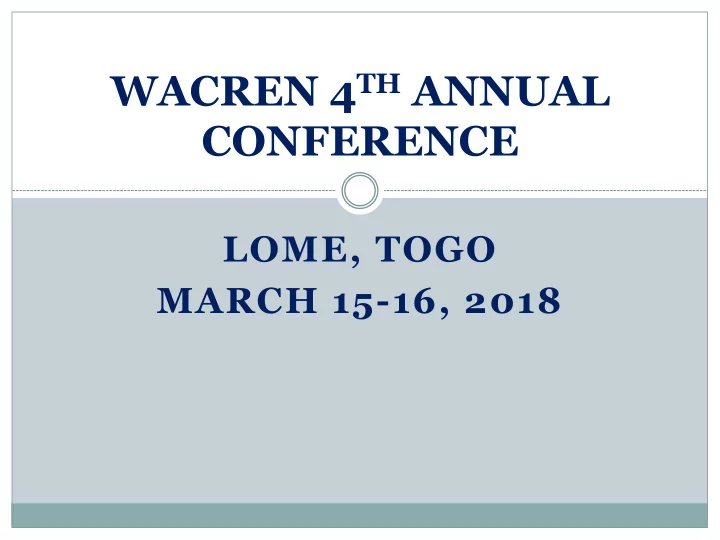

WACREN 4 TH ANNUAL CONFERENCE LOME, TOGO MARCH 15-16, 2018
Building Capacities for Collaborative Innovation in Higher Education LESSONS OF THE NREN- LIBRARY CONSORTIUM ECOSYSTEM IN SIERRA LEONE
PRESENTERS SONGU , Thomas ICT Director, Njala University, CEO, SLREN tsongu@njala.edu.sl CONTEH-MORGAN , Miriam (Associate Professor) Deputy University Librarian University of Sierra Leone, Steering Cttee Chair, Consortium of Sierra Leone Academic Library & Information Services miriam.conteh-morgan@usl.edu.sl
OUTLINE Background ¡ The higher education landscape in Sierra Leone ¡ Academic libraries ¡ ICT infrastructure The development of SLREN and ConSALIS Collaboration: Tensions and Synergies ¡ Successes ¡ “Possibility for Possibilities” Conclusion
BACKGROUND
PREVAILING ENVIRONMENT in HEIs Academic staff – low numbers, few Ph.Ds and Professors, low motivation, gender imbalance Aged infrastructure Rising student enrolment Inefficiencies in service delivery
PREVAILING ENVIRONMENT cont’d Competition among institutions -- blurry lines of missions. Competition for students --duplication of courses Little collaboration among HEIs – few opportunities for joint projects pursued.
PREVAILING ENVIRONMENT INSIGNIFICANT USE OF TECHNOLOGIES FOR TEACHING, LEARNING, RESEARCH OR EFFICIENT SERVICES: ÷ No smart classrooms, learning management systems ÷ No automated library catalogues/ILSs ÷ No integrated information management systems ¡ Poor research capabilities ¡ Landscape crowded by a combination of mostly uncoordinated, local and international actors
ACADEMIC LIBRARIES “IT is foundational in the twenty-first library” (Stachokas) Patchy technology solutions • • No automated library catalogues/ILSs • No overarching vision, plan, policies and • strategies on how to roll out IT- dependent • services • Majority of staff not IT literate
NATIONAL ICT STRATEGY Ø Government and development partners taking the leadership in ICT/Telecom infrastructure modernization –ICT Policy in 2007 Ø Successfully landed sub-marine fiber cable through ACE ( 2011) Ø Deployed terrestrial fiber backbone to take the huge traffic from the landing station to be distributed across the country. Ø SIERRATEL completed the deployment of the Freetown Metropolitan Area Network Ø Commercialisation of the Fiber Landing Station Ø Operationalising the Sierra Leone Cable Network (SALCAB)
NATIONAL ICT INFRASTRUCTURE Integrated Infrastructure with a hybrid Last mile solution of aerial Fibre and High Speed wireless (4G-LTE/WIMAX) Network Operation Centre Phase 3- Aerial FTTH/ FTTP NATIONAL Phase 1-MDAs connected with WIMAX and Ariel FIBRE Fibre for e-Governance platform for central and BACKBONE local government Phase 2(c )- Operators Towers connected to Phase 2 (b) Backbone (better quality, Community-Based wifi lower cost, higher band Start-ups and remote rural Phase 2 (a)- SMEs and Industries width) schools, health centres universities, schools, hospital etc.
NEW SYNERGIES 2017 2014 : INASP partners with Fibre connectivity brought to University of Sierra Leone and universities and schools (pilot led Njala University à joint by SLREN) workshops for researchers and HEI partnership wins DfID grant librarians, seminars, conferences triggering interest Consortium of HEIs (CHEI-SL) in research again formed Conference of Vice-Chancellors & 2016 : SLREN formed Principals (CVCP) formed 7 HEIs partner to apply for Consortium of Sierra Leone DfID grant Academic Library & Information Services (ConSALIS) formed
“TRIPLE R” PRIORITIES OF HEIs SLREN and ConSALIS have come together to support HEIs in: ¡ R ebuilding (capacities and systems and infrastructures) ¡ R ealigning (visions, curricula etc) ¡ R esearch strengthening (rethinking funding, new partnerships/common agendas)
STRATEGIC REORGANISATION HIGHER EDUCATION INSTITUTIONS
LIBRARY-led INITIATIVES Discovery Platform To Leverage Teaching, Learning And Research – IR + Journal Publishing USL-NU training on research writing for early career researchers Cross-institution training of early career researchers LIBRARY CONSORTIUM ¡ Subscription to e-journal databases ¡ National union catalogue ¡ Cooperative services (cataloging, interlibrary services etc)
SLREN-led INITIATIVES BUILDING ICT INFRASTRUCTURE TO LEVERAGE TEACHING, LEARNING AND RESEARCH IN HEIs: Ø FIBER OPTIC BROADBAND CONNECTIVITY Ø BUILDING CLOUD INFRASTRUCTURE AS A SERVICE Ø LEARNING MANAGEMENT SYSTEM (MOODLE) Ø SUPPORTING WEB PORTAL DEVELOPMENT Ø PROMOTING e-LEARNING Ø PROMOTING ICT CAPACITY BUILDING 16
WINNING STRATEGIES INFLUENCE MAPPING ¡ MOST INFLUENTIAL (e.g. VC&Ps, FDs, Former VC, deans) ¡ STRONGLY SUPPORT (advocates for research, progressives) ¡ STRONGLY OPPOSE (none identified) ¡ LEAST INFLUENTIAL (monitor & engage periodically as status could change)
SOME RECOMMENDATIONS Librarians acquire advocacy, lobbying, marketing and other key competencies and skills to showcase their importance and contribution to the success of their organizations. This would help in the funding of library projects and activities. Libraries and librarians create a new organisational culture that privileges updated professional values and philosophies of librarianship. NRENs and library consortia organize joint training courses for librarians to acquire ICT skills and ICT applications in libraries and for IT staff to understand library issues.
SOME RECOMMENDATIONS SLREN and ConSALIS consider extending their cooperative sharing to include expertise and equipment to help less endowed libraries to introduce and sustain ICT services. HEIs in Sierra Leone develop institutional IT policies that are aligned with the national government’s and SLREN’s. HEIs to introduce new courses which would enable their students to cultivate and imbibe new competencies and skills. Courses on advocacy, lobbying, proposal writing, managing ICT projects in library / systems librarianship are examples.
Recommend
More recommend